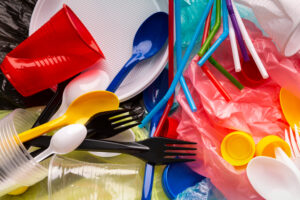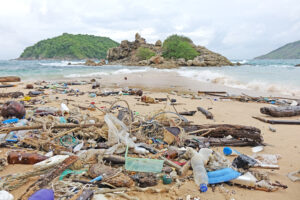Law 51 – 2022

What is the Law 51 of 2022?
Law 51 of 2022 is the Law that prohibits the sale, distribution, and use of single-use plastics in all commercial, sales, and distribution premises authorized to conduct business in Puerto Rico. You can read the entire law here. You can also read the draft of the regulation related to the law here.
Which plastics does it prohibit to sell or to distribute?
Cutlery, plates, straws, glasses, cups, food containers made of expanded polysterene ( known as “foam”).

Why was the law made?
To protect the environment and to raise public awareness of the use of plastics. Only 14% of plastics get recycled worldwide. 86% of plastics end up in landfills, most of which are at capacity in Puerto Rico, or in our ecosystems contributing to environmental pollution, the loss of species, and global warming. Single-use plastics cannot be reused or recycled. When these plastics end up in our bodies of water or soil, they get fragmented into microplastics and nanoplastics and end up inside plants, animals, and our own bodies.
When does the law take effect?
According to the draft of the regulation, the law takes effect on July 1st, 2024.
What happens next?
As of July 1, 2024 and until December 31, 2024, non-compliance with the provisions of Law 51-2022 and the regulation will entail a “Notice of Default”.
As of January 1, 2025, non-compliance with the provisions of Law 51-2022 and its Regulation will entail a fine.
- First Offense: $500.
- Second Offense: $1,000.
- Recidivism. $5,000.
- 10% Monthly Surcharge. The offender must pay the fine within 30 days of being issued. Once this period has elapsed without the DACO receiving the payment of the fine, the amount owed will increase by 10% monthly.
 What alternatives are there to single-use plastics?
What alternatives are there to single-use plastics?
- Reusable bottles, containers, cups, and cutlery. Businesses can buy dishwashers or hire employees that wash dishes. The creation of businesses that wash dishes for food trucks or small restaurants can also be stimulated.
- Compostable plates, cups, and cutlery only if they are going to be composted. Look for the ones that are BPI Certified. Compostable items that are composted become one of the components of compost, which is used as nutrient-rich soil in agriculture to grow edible plants. Compostable items that are not composted end up in landfills taking up space and emitting greenhouse gasses that contribute to global warming. Compostable products and biodegradable products are not the same. For information about the difference about these two terms click here and/or here. We encourage businesses to make Joint Purchasing Consortiums to buy compostable products at bulk prices to reduce costs.
- Products made of cardboard or paper.
